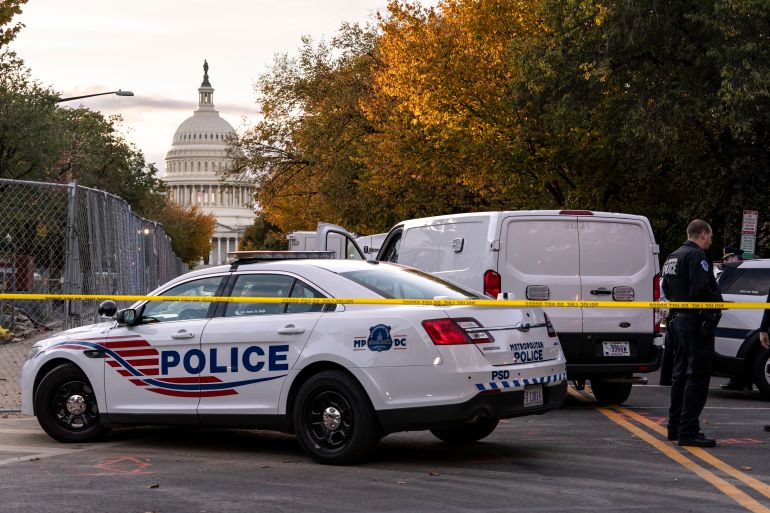US capital withdraws criminal justice reform bill
Move comes as the US Senate was expected to vote down proposed changes to criminal code in Washington, DC.

The Washington, DC, city council has issued a letter to the United States Senate to withdraw controversial legislation that raises questions about criminal justice reform and the US capital’s ability to govern itself.
The Senate was expected this week to vote down the bill, which includes a suite of changes to overhaul the city’s local criminal code. The US Constitution grants Congress oversight over the capital’s legislation.
Keep reading
list of 3 itemsAtlanta: Police shooting of activist fuels ‘Cop City’ controversy
US ‘botched’ executions reach all-time high, report finds
“It’s clear that Congress is intending to override that legislation,” Phil Mendelson, the chairman of Washington’s city council, told reporters at a legislative press conference on Monday. “My letter – just as I transmit bills for their review – withdraws from consideration the review.”
The city’s Democrat-led council passed the reforms in November.
Among the changes approved was the elimination or lowering of mandatory minimum sentences for certain violent crimes, a move that proponents hoped would help address issues like mass incarceration and racial bias in the justice system.
But with crime emerging as a pivotal election issue this year, congressional Republicans and some Democrats have criticised the reforms as evidence that the city is “soft on crime”.
During Monday’s press conference, Mendelson said withdrawing the legislation “means that the clock stops” on any congressional consideration of the reforms.
“This will enable the council to work on the measure in light of congressional comments and to retransmit it later,” he said. “I will say I don’t know that that will stop the Senate Republicans, but our position is that the bill is not before Congress any longer.”
President Joe Biden had signalled last week that, while he supports “DC statehood and home rule”, he would not intervene to stop Congress from overturning the city’s reforms.
“If the Senate votes to overturn what D.C. Council did – I’ll sign it,” he wrote on Twitter on Thursday.
Doing so would have allowed Congress to nix a Washington, DC, law for the first time in more than 30 years.
Residents of Washington, DC, have no voting representation in Congress. They elect only a non-voting delegate in the House of Representatives.
Congress, however, has jurisdiction over the district in “all cases whatsoever”, allowing it to overturn local laws. These measures were enacted in the US Constitution as a curb against the capital growing too powerful.
But critics say residents in the Democratic-leaning city have effectively been disenfranchised with more than 671,803 people calling Washington, DC, home – a population larger than that of the states of Vermont and Wyoming.
The city’s criminal justice reforms, known as the Revised Criminal Code Act of 2022, were divisive even on the local level, however.
On January 4, Democratic Mayor Muriel Bowser announced she would veto the changes.
“A complete overhaul of our criminal code is a once-in-a-century opportunity. I believe it’s more important to get this opportunity right than to add policies & weaken penalties into what should be a bill that makes DC safer,” she wrote on Twitter.
But the city council overrode her veto, leading Congress to introduce what is called a resolution of disapproval against the reforms.
The resolutions were led in the House by Georgia Republican Andrew Clyde and in the Senate by Republicans John Boozman of Arkansas and Bill Hagerty of Tennessee.
“As violent, brazen crime in Washington occurs with increasing frequency, the last thing we should be doing is granting perpetrators leniency and adding more burdens for District law enforcement,” Boozman said in a statement.
The House of Representatives had voted 250-173 in early February to block the criminal justice reforms with 31 Democrats joining the Republican majority.
Democrats in the Senate, including West Virginia’s Joe Manchin, had also signalled a willingness to side with Republicans, were the reforms to come up for a vote in that chamber.